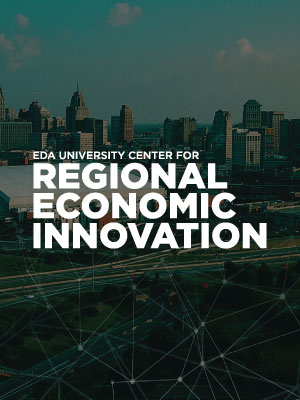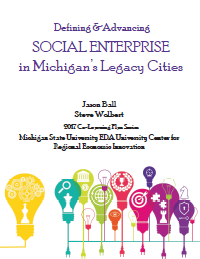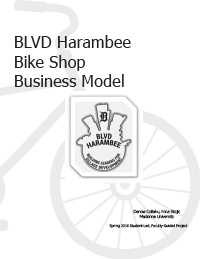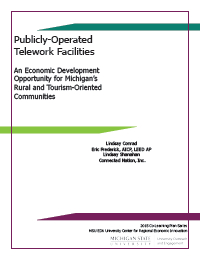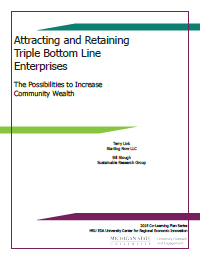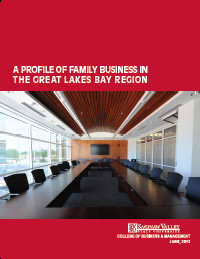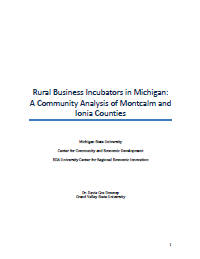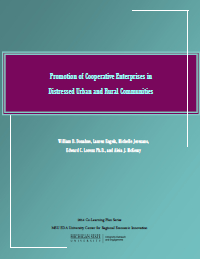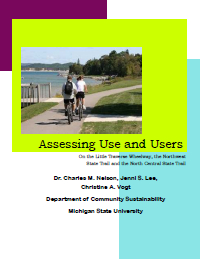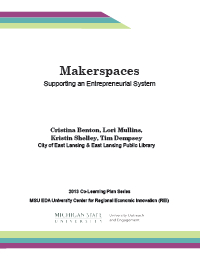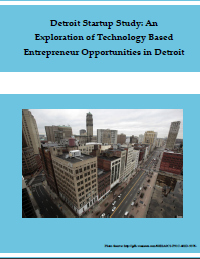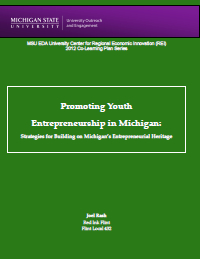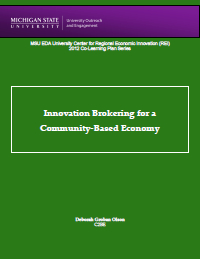Discovering and applying new and innovative economic development tools, models, policies, and programs
Creating Jobs and Wealth in Distressed Michigan Communities
Entrepreneurship
-
2021: Makerspace Prototype Exploration for Local Micro-Business Incubator
Author(s): Lisa CasperRead the Report About the ProjectThis project is designed to hedge against further decline in our economy by creating the preconditions to help graduating high school seniors to create economic opportunities, innovate their way forward, connect with innovation and entrepreneurship resources and lead by example. Scope & Community Engagement Michigan Technological University's innovation and entrepreneurship resource hub, Husky Innovate, was approached by New Power Tour, Inc.(NPT-501c3), to build an economic support mechanism for our economically-challenged area of the Western U.P. Our partnership takes the form of a Houghton High School National Honor Society (HHSNHS) student-led pilot project that will familiarize students with the steps involved in building a business by participating in experiential learning exercises at each phase of an innovation. During this pilot project, students will engage in activities to understand opportunity recognition, prototyping, product-market-fit, brand definition, commercialization and sales. While students gain knowledge and experience as innovators, they will connect with resources within our local innovation and entrepreneurship ecosystem and strengthen community networks while simultaneously highlighting gaps to be addressed.
-
2021: Community Capital Accelerant
Author(s): Chris MillerRead the Report About the ProjectThe project intends to increase the number of Michigan projects utilizing Community Capital. Community Capital refers specifically to financial capital that is locally sourced from both accredited and especially non-accredited investors. The goal is to expand projects using local investors to start, support, or expand a Michigan business. The scope of works includes identifying local champions who have been involved in donation or investment crowdfunding campaigns, helping them build local investment teams, providing materials and support, and helping launch new Community Capital campaigns.
In addition, part of the outreach will present information about a bill introduced in the Michigan Senate (SB13 of 2021) and House (HB4116) that would provide a first in the nation income tax credit equal to 50% of any investment made in any Michigan business by Michigan residents.
-
2020: Strategy for Youth Empowerment and Entrepreneurship in the North Side of Flint
Author(s): Psalm Bingham, Dr. Stephen GasteyerRead the Report About the ProjectThis project will develop an outline for youth entrepreneurship in the North Side of Flint, Michigan with the help of WOW Outreach of Flint. The report will further WOW Outreach’s goals of reducing violence through positive opportunities and increasing economic opportunities through the use of Flint’s Community Capitals Framework. Through this research WOW Outreach will be able to address critical development needs, specifically focusing on youth empowerment, and allow youth entrepreneurship to grow and prosper in the North Side of Flint.
-
2019: Community Stakeholder and Neighborhood Resident Strategies for Community Revitalization
Author(s): Norman Christopher, Private ConsultantAbout the ProjectThis innovation project will build upon the previous MSU REI student led research project on resident driven investment strategies, but also explore other viable social impact and social entrepreneurship community revitalization and investment strategies that are now available for use such as Charitable Loan Funds, Community Land Trusts, Social REITS, and Opportunity Zones etc.
With the input of NGOs, businesses, foundations and other organizations, a community revitalization "playbook" will be developed that discusses the major economic development and social impact investment strategies that are now available for use by both community residents as well as the public and private sector. A glossary of key social impact terms will also be prepared.
Key statewide case studies will be used on a best efforts' basis, so that other Michigan cities, communities, and neighborhoods can collectively learn what type of social impact investment strategy would work best in their community. A standardized approach will be used to evaluate each social impact investment strategy for potential use. This social impact investment "playbook" will be of help and assistance to foundations and other grant making institutions, community residents, philanthropic donors, social NGOs, as well as local communities and neighborhoods as they seek additional sources of capital to increase economic development activities and address specific social impact areas of concern, such as affordable housing. This project will be considered as a "work in progress."
-
2017: Social Entrepreneurship in Legacy Cities
Author(s): Jason Ball and Steve Wolbert, Community Ventures and Urban Entrepreneurship InitiativeRead the Report About the ProjectA functional definition of social entrepreneurship and social enterprise in the context of Michigan’s legacy cities is necessary for planning. To do this, the project will consist of research on at least five case studies of social enterprises in Michigan cities to illustrate the definition, as well as existing data on the performance of various businesses along a continuum of social enterprise to evaluate the business success and social impact of different approaches. This will allow an identification of existing resources related to economic development, workforce development, and social services that can support a social enterprise approach to economic development.
Project Updated As Of September 30th, 2017
-
2016: BLVD Harambee Business Model
Author(s): Denise Collaku & Nina Stojic, Madonna UniversityRead the Report About the ProjectThis project established a business model and framework for a community bike shop that is by BLVD-Harambee, a non-profit youth mentorship organization led by the Episcopal Church of the Messiah.
Project Updated As Of September 30th, 2016
-
2015: Publicly-Operated Telework Facilities: An Economic Development Opportunity for Michigan's Rural and Tourism-Oriented Communities
Author(s): Eric Frederick, Connect MichiganRead the Report About the ProjectConnect Michigan created a Co-Learning plan that addressed teleworking, also referred to as "telecommuting," and its importance to twenty-first century economic development in Michigan. Telecommuting enables an employee to work from a location that is remote from the traditional bricks and mortar environment by utilizing high-speed Internet connectivity and related technology. This Co-Learning Plan and accompanying analysis addressed whether a model or set of best practices exists for public entities to develop, support, own, and/ or operate a telework shared workspace, and the impact these facilities could have on the local economy. In addition, the analysis explored the opportunities that telework enables and why this employment arrangement, though relatively nascent, is increasingly becoming more common.
Project Updated As Of September 30th, 2015
-
2015: Policies and Practices to Support Triple Bottom Line Development
Author(s): Terry Link, Starting Now, LLC; Bill Stough, Sustainable Research GroupRead the Report About the ProjectNew profit and nonprofit enterprise models are capturing the imagination of innovative entrepreneurs to create a way to make a good living while addressing urgent environmental and social needs like quality food, community, inequality and climate change. Community economic development organizations should consider strategies to foster and grow these enterprises which provide additional community wealth. This orientation requires an approach that does not depend on attracting the largest international conglomerate possible, but on cultivating local entrepreneurial enterprises whose business model purposefully addresses improving community wealth and quality of life.
Project Updated As Of September 30th, 2015
-
2015: P3 - Pathways from Prison to Prosperity: A Framework for Training Ex-Offenders to be Entrepreneurs in Legacy Cities
Author(s): About the ProjectProject Details
Co-Learning Plan - 2015
Author: George Berghorn, Ph.D., Berghorn Group/Green Prisons
Summary
This Co-Learning Plan developed programs which have direct benefits to the communities where ex-offender entrepreneurs are living and working, and to the state of Michigan through reduced recidivism resulting from stable employment and reduced costs of re-incarceration.
Interview Video
-
2015: Family-Owned Business Database for the Great Lakes Bay Region
Author(s): Saginaw Valley State UniversityRead the Report About the ProjectFamily businesses remain a vital force for innovation, job creation, and community development in Michigan. The Saginaw Valley State University Family Business program proposed to create a comprehensive database of family-owned businesses in the Great Lakes Bay Region and surrounding counties.
Project Updated As Of September 30th, 2015
-
2014: Rural Business Incubators in Michigan: A Community Analysis of Montcalm and Ionia Counties
Author(s): Davia Cox Downey, Ph.D., Grand Valley State UniversityRead the Report About the ProjectMontcalm and Ionia counties opened a business incubator inside Montcalm Community college to explore Rural Economic and Entrepreneurial Strategies. Entrepreneurship has been an integral part of the economy in the United States since its inception and it is critical for the state of Michigan as it continues to develop its economy.
Project Updated As Of September 30th, 2014
-
2014: Promotion of Cooperative Enterprises in Distressed Urban and Rural Communities
Author(s): Edward Lorenz, Ph.D., Public Affairs Institute of Alma CollegeRead the Report About the ProjectThis Co-Learning Plan showed how Flint, Michigan has developed a unique program that brings together diverse community stakeholders to support youth entrepreneurship. It is targeted at educators, economic development professionals, and those interested in grassroots community initiatives.
Project Updated As Of September 30th, 2014
-
2014: Assessing Use and Users: On the Little Traverse Wheelway, the Northwest State Trail and the North Central State Trail
Author(s): Charles M. Nelson, Jenni S. Lee, Christine A. Vogt, Michigan State UniversityRead the Report About the ProjectThis project focused on the benefits of trails as an economic development tool. Trails are a useful and sustainable source of both tourism money and convenient transportation that does not rely on the automobile. To better understand how to enhance the qualities of trails in Northern Lower Michigan, the Department for Community Sustainability at Michigan State University partnered with numerous entities including the Top of Michigan Trails Association and Emmet County to prepare an assessment of trail use and users from Memorial Day weekend 2014 to Labor Day weekend 2014 on portions of the Little Traverse Wheelway in Emmet County and the multi-county North Central State Trail. The assessments provided observational data of trail use and users and responses from a sample of those users who are adults 18 or over to a self-administered questionnaire.
Project Updated As Of September 30th, 2014
-
2013: Makerspaces: Supporting an Entrepreneurial System
Author(s): Christina Benton, Tim Dempsey, Lori Mullins, & Kristin Shelley, City of East Lansing & East Lansing Public LibraryRead the Report About the ProjectThis Co-Learning Plan provided an overview of the Makerspace movement -- an initiative that supports creative process and innovation through providing a workshop space where amateurs and professionals interested in electronics, robotics, software, wood or metal working or art could expand their skills, invent, and build new products in a collaborative environment. The project also focused on the makerspace programs developed by public libraries and suggests the creation of 'maker' programs at public libraries to support an innovative and entrepreneurial ecosystem.
Project Updated As Of September 30th, 2013
-
2013: Helping Entrepreneurs Revitalize Our Economy & Society
Author(s): Sam CarterAbout the ProjectThis Co-Learning Plan detailed an effort to establish a collegiate chapter of the Lansing Black Chamber of Commerce in order to impact the number of entrepreneurs among members of urban and distressed communities. This project hoped to give students "heroes" the inspiration to look within themselves and find the creativity and passion to aspire to extraordinary goals.
Project Updated As Of September 30th, 2013
-
2013: Detroit Startup Study: An Exploration of Youth Technology Based Entrepreneur Opportunities in Detroit
Author(s): Sahara Horn, Madonna UniversityRead the Report About the ProjectThis study investigated the resources and support available to Detroiters to create successful technology businesses. It specifically focused on resources and opportunities applicable to young people. The research provided a review of the courses available in Detroit best suited for newer generations.
Project Updated As Of September 30th, 2013 -
2012: Promoting Youth Entrepreneurship in Michigan: Strategies for Building on Michigan's Entrepreneurial Heritage
Author(s): Joel Rash, Red Ink FlintRead the Report About the ProjectThis Co-Learning Plan brought the Mondragon model into the realm of higher education by educating students in the value of building a cooperative approach to community entrepreneurship. The process began with developing several cooperative educational modules to guide young people and interested adults from cooperative culture and social structures to cooperative entrepreneurship.
Project Updated As Of September 30th, 2012
-
2012: Innovation Brokering for a Community-Based Economy
Author(s): Deborah Groban OlsonRead the Report About the ProjectThis Co-Learning Plan presented and analyzed the efforts of the Community-Based Economy Group (CBE Group) in Detroit to adapt proven models of community-based business and social practices to help locally-rooted businesses accelerate transformation of Metro Detroit to a sustainable and inclusive local economy.
Project Updated As Of September 30th, 2012


